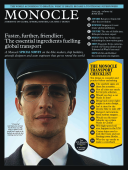
Issue 44
The new issue of Monocle includes a survey of the players and projects driving the transport sector forward.
In This Issue
Oops! No content was found.
Looks like we no longer have content for the page you're on. Perhaps try a search?
Return Home

